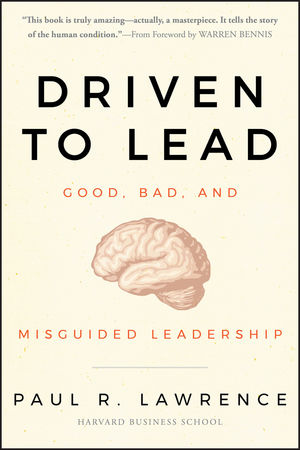Driven to Lead: Good, Bad, and Misguided LeadershipISBN: 978-0-470-62384-8
Hardcover
336 pages
August 2010, Jossey-Bass
 This is a Print-on-Demand title. It will be printed specifically to fill your order. Please allow an additional 10-15 days delivery time. The book is not returnable.
|
||||||
Connect with Wiley Publicity
From Wall Street to Capitol Hill, in this country and around the world, “people without a conscience” often make their way into top positions in business, government, and other fields. According to Paul R. Lawrence, Wallace Brett Donham Professor of Organizational Behavior Emeritus at Harvard Business School, throughout history, leaders who are missing this important trait have produced catastrophic effects for us all. Looking at the recent financial crisis as an example, Lawrence asserts that a few Wall Street leaders who lack a moral sense of judgment knowingly caused the global meltdown. “They did so to greatly enhance their own personal wealth in accordance with their innate, insatiable drive to acquire and with total disregard for the impact of their actions on their own companies or even on the worldwide public….”
In his new book, DRIVEN TO LEAD: Good, Bad, and Misguided Leadership (Jossey-Bass, August 2010), Lawrence, long one of the giants in the field of organizational behavior, offers an integrated explanation of both human behavior and leadership. Through the study of Darwin’s theory of human evolution and the application of his insights to contemporary research, Lawrence applies a scientific approach to illustrate how leadership – good, bad, and misguided – is natural to the human condition.
DRIVEN TO LEAD proposes – and demonstrates – that good leadership is the application of the extraordinary decision-making process built into the human brain. According to Darwin, our brains have evolved to juggle four innate drives that underlie all behavior. These drives are (1) the drive to acquire—from essential resources to social status; (2) the drive to bond in long-lasting, mutually caring relationships; (3) the drive to comprehend – to learn and make sense of our environment; and (4) the drive to defend ourselves, our loved ones, and our property.
Lawrence focuses on the idea that leadership is not simply something that has an external effect on other people; it’s what is actually happening inside the brain. DRIVEN TO LEAD goes on to demonstrate how leadership is a trait we can improve and apply as methodically as we improve and apply technology and medicine.
Illustrating the scientific examination of human behavior and its role in leadership, DRIVEN TO LEAD is divided into three parts:
- The Leadership Brain: the biological underpinnings of leadership behavior.
- The History of Leadership: an examination of the critical turning points in the leadership of political institutions; the rise of corporations as the leading economic institution; and the leadership of religious, artistic, and scientific institutions.
- Modern Political and Economic Leadership: an examination of current leadership and solutions for keeping on track and practicing good/moral leadership.
DISCUSSION TOPICS – Based on the theories presented in DRIVEN TO LEAD, Lawrence is available to discuss a range of topics, including:
- How humans are born with a good leadership brain, but need to learn how to use it. [Chapter 2]
- How the brain actually makes complex leadership decisions. [Chapter 2]
- The role of women in evolving Homo sapiens. [Chapter 3]
- A moral sense of conscience is the birthright of human beings. [Chapter 3]
- How we have ignored Charles Darwin’s great insights about human beings. [Chapter 3]
- The threat posed by people without conscience assuming top positions in business and government. [Chapter 3]
- An explanation of a full range of leaders from Ghandi to Hitler. [Chapter 4]
- A formula for reconciling religion and science. [Chapter 7]
- How U.S. business and U.S. government need reforms. [Chapters 8 and 10]
- How the current worldwide recession was deliberately created by a few Wall Street bankers. [Chapter 9]
- How to build structures of trust despite the costly distrust that plagues the world. [Chapter 11]
For more information about DRIVEN TO LEAD or to arrange an interview with Paul Lawrence, please contact Newman Communications.



